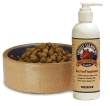Essential Fatty Acids
When people think about EFA's and Omega's the first thing that comes to mind is a healthy skin and coat. It's well known for changing the dry dull coat of your dog or cat to a soft shiny coat with a brilliant sheen that make people say "WOW".
But, EFA's do so much more, they serve a number of major vital functions in our dogs and cats bodies. They are required for the transport and metabolism of both cholesterol and triglycerides. They are required for normal brain development and brain function. They are required in visual function, brain and nerve functions, and adrenal function. They are required in the structure of the membranes that surround each cell in our body. They stimulate metabolism, increase metabolic rate, increase oxygen uptake, and increase energy production. Omega-3s inhibit the production of prostaglandin. Prostaglandins play important roles in the development and progression of chronic inflammatory conditions such as rheumatoid arthritis (Research has shown that supplementing with omega 3 fish oils can result in a significant reduction in joint inflammation, this reduces morning stiffness and lowers the number of painful joints in rheumatoid arthritis patients both animal and human), lupus, inflammatory bowel disease and a variety of other inflammatory disorders including Kidney Disease. They even work to slow down growth of cancer cells! 1
They also help to build muscle mass, strong bones and teeth, and nourish your pets skin and coat.
There are two main classifications of EFA's, Omega 3's and Omega 6's, but keep in mind not all Omega's are created equally, they are further broken down into the categories below.
|
|
Abbreviation
|
Source
|
|
OMEGA-3
|
|
Alpha-Linolenic
|
ALA
|
Flaxseed, pumpkin seed, soybean oil
|
|
Eicosapentaenoic
|
EPA
|
Marine fish oil
|
|
Docosahexaenoic
|
DHA
|
Marine fish oil
|
|
OMEGA-6
|
|
Linoleic
|
LA
|
Sunflower oil, safflower oil, soybean oil, corn oil, evening primrose oil
|
|
Arachidonic
|
AA
|
|
|
Gamma-Linolenic
|
GLA
|
Evening primrose oil, borage oil, black currant seed oil
|
|
Dihomo-gamma-Linolenic
|
DGLA
|
|
What's the difference between the Omega's?
ALA is plant based omega 3s, which is considered short chain omegas. ALA Omega 3 is considered to be "Inactive" and must be converted to EPA and DHA to be of any value to your pet. Dogs and Cats are not designed to efficiently convert ALA into to EPA and DHA, so the effects are lessoned, some dogs can produce the enzymes to activate the "Inactive" Omega's 3 and some dogs can't.
DHA and EPA are long chain Omega 3s and are absorbed readily and directly within the body and are considered active.
Why is the Ratios of Omega 6's to Omega 3's Important?
These fats work together, in order for them to work together a ratio between 2:1 and 5:1 is consider optimum. In most dog foods you will see a lot of Omega 6's and not enough Omega 3's. This is why it's important to supplement your dog's food with EFA's to the proper ratio. Grizzly Salmon Oil is one product that has a 1:8 ratio of Omega 6 to 3, which balances out most dog food bringing the ratio's to where they should be.
There are many other EFA's on the market for example: Nordac Naturals Cod Liver Oil (No odor) or fishy dog breath smell and Flying Basset EFA which is a great source of GLA Omega 6's.
So what have we learned?
Fish based Oils are "active" omega's and readily absorb by the animal body, Plant based Oil are "Inactive" in which some dogs can activate it and others can't. Most dog food, even premium dog food are lacking in the proper balance of omega 3's and omega 6's, so read the analysis on the label and supplement your dogs food with Fish Based EFA's to achieve the correct ratios.
1. http://www.thewholedog.org/id23.html
2. http://www.orijen.ca/orijen/ORIJEN_White_Paper.pdf
3. http://www.dogfoodproject.com/index.php?page=fattyacids
4. http://www.spca.com/petcare/item/107
|






